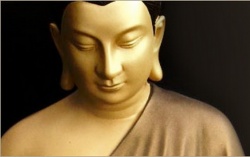Wrathful practice
“Wrathful practice” is an approach within Tantric Buddhism that can dramatically accelerate your progress. However, it is only workable if you are willing to have Buddhist practice be the sole important thing in your life, under close supervision of a lama, after many years of preliminary practice. And, it comes with a steep price, and a serious risk.
Tantric Buddhism is the path of transformation. The practices of Tantra transform negative emotions into positive, enlightened ones. Usually in Tantra we wait for negative emotions to occur, and then apply transformative methods. If you are sufficiently committed, however, you can deliberately stir up negative emotions in order to transform them. This makes it possible to practice transformation as much as you want—rather than having to wait around for something bad to happen.
The most negative emotion is hatred. Wrathful practice is called “wrathful” because hatred is the emotion you most stir up and attempt to transform. As part of the method, you rely on a “wrathful yidam,” or visualized enraged deity. (Dorje Phurba, shown at the top of this page, is an example.) With this practice, hatred can be transformed into the clarity of enlightenment.
According to Tibetan Buddhism, destruction is one of the four functions of a Buddha. Wrathful practice gives you the clarity to know what must be destroyed, and the ferocity to destroy it.
Generally, Buddhist practice makes your life work better—and for many of us, that is the main motivation. Wrathful practice is likely to make your life worse—at least for several years. Part of the wrathful method is to abandon, or even actively destroy, any aspect of your life that interferes with your practice. Everything in life except practice can fall apart. That is what I called the “steep price.”
The “serious risk” is that you will fail in the transformation—and fail to see that you have failed. This danger is spoken of frequently in Tibetan texts—and this outcome is common. Wrathful yidam practice can produce extraordinary arrogance. That is based on the perception that “I have transformed myself into an enlightened, wrathful being.” (Properly, yidam practice is the perception that “the yidam is occurring.” It is non-personal.)
It is easy to persuade yourself that you have succeeded when you have not. Then you believe you have complete, clear understanding of Buddhism, you are qualified to say who or what needs to be destroyed, and you are just the one to do it. That makes you dangerous to others.
